The Aka Pygmies : a threatened freedom.
Par teddy, dans ENGLISH -# 32 - Fil RSS
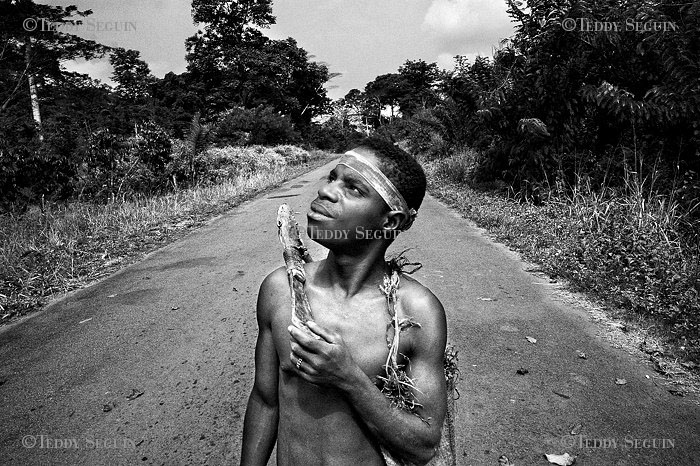
Granted as ãIntangible Cultural Heritageã by UNESCO, the Pygmies are considered the first inhabitants of Central Africa. In the past, they covered the whole rainforest located in the southwest of the country, searching for wild mushrooms, edible roots and game animals. Throughout their history, the pygmies have developed highly specific skills related to hunting, dancing, music and pharmacopoeia. In recent years, globalization has begun to catch up to them, making this nomadic people a more sedentary agricultural population settled around cities and villages. Still mostly unknown to most inhabitants of Central Africa, the Aka attempt to preserve a traditional way of life while modernizing and liberating themselves from the slavering grip of Bantou families. Caught between inequitable trade and pure exploitation working on villagersã plantations, these Aka Pygmies have also become the focus of all the monotheist proselytes.
When in the forests, the Aka Pygmies reclaim their freedom and independence. In the middle of the rainforest, some 30 kilometers away from settled villages along the Lobaye river, is the Wazengue camp whose chief is Bombe. As a chief, Bombe is the property of Alexi, chief of one of the riverside Bantou villages. When in Alexiãs village, Bombe walks slowly, head and eyes down. However, when we see him in the rainforest, he gains stature, stands proudly and looks far ahead. Here, he is the chief, the knowledgeable man of this dense forest; here he is feared and admired by the Bantou.
Pygmiesã lives are filled by paradoxes. Proud of their culture and lifestyle, they look down on the Bantou who they see as ignorant of the forest. Nevertheless, they remain enslaved by them, as they have been for centuries. Capable of hard work and courage when it comes to hunting game animals, the Pygmies become lazy and compliant when working for the Bantou or the wali-coco. Needless to say this sometimes leads to violent retaliations.
Fundamentally free they are now becoming increasingly tied down by debts and by slavery. Their in-depth knowledge of the forest has long permitted them to live in a self-sufficient way, far from other populations. Their environment provided them with meat, edible roots, clothes, fish and medical plants. They built their houses as they moved around throughout the forest, following game animals and adapting to the seasons. Today, Bombe and his people live in three permanent camps, where their once temporary houses have become old and dirty. Slowly, the Aka Pygmies are settling down, moving only during the rainy season to collect caterpillars. It is only during these four summer months that they disappear into the depth of the forest and lead a nomadic life. When they return, this much appreciated delicacy is traded for manufactured goods such as thongs, bowls and secondhand clothes. Despite their need to do commerce with surrounding populations, the Aka Pygmies are more than often at a disadvantage, frequently trading their goods for alcohol and tobacco. As a result, they are repeatedly indebted toward the other villagers or the wali-coco. For example, the collect of coco leaves is increasingly important to the Aka Pygmies, so much so that theyãll neglect the basic collecting of food to feed their families. Hence, despite living in one of the worldãs largest granary, they may suffer from hunger.
Exploited by all, the Aka Pygmies are seeing their lifestyles altered. When they are not enslaved by Bantous, working on their plantations, the wali-coco are inflating the prices of an unfair trade. For example, a pair of thongs or a simple t-shirt may cost as much as 40 bunches of coco, or approximately 4 days of work. In order to escape such situations, some pygmies are, with the help of religious communities, building permanent settlements along roads. Nguma is such a village where the cost of independence may however be much higher than expected. It all started six years ago when eight distinct clans joined to escape the enslavement from the Bantous of Bagandou, located south of the Lobaye river. With the help of the Zoumea nuns and the Italian association: ãamici per il centrafricaã, they decided to build a ãrealã village, in the middle of the forest, with cob houses and small lands for cultivation. At the time, it was an ambitious project which sounded almost perfect. Six years later, the report is mitigated. The village is still standing with 150 inhabitants and hygiene conditions much above that of huts villages. In addition, the villageãs school is modern and provides primary schooling to young pygmies. However, being fundamentally gatherers, the agricultural success of the village is still to come. Villagers are still unable to be self-sufficient and this despite the help of an agricultural engineer sent by the ãamici per il centrafricaã association. Much work is still needed for these pygmies to become agriculturalists who carefully tend to their fields. If that is indeed what is wished. We can thus say that the experience of Nguma is successful in as much as the Aka pygmies have freed themselves from enslavement, yet loosing much of their culture and traditions in the process. Meanwhile various religious communities such as the Muslims, the Christians and the Baptists are fighting to ãsaveã the pygmiesã souls.
This evolution is inescapable and the challenge is for the Pygmies to preserve their cultural richness and uniqueness. In the globalization forces that transform populations worldwide, the pygmies are just one of many examples. They have much to loose in the process yet may already be unable, or unwilling, to turn back the clock.
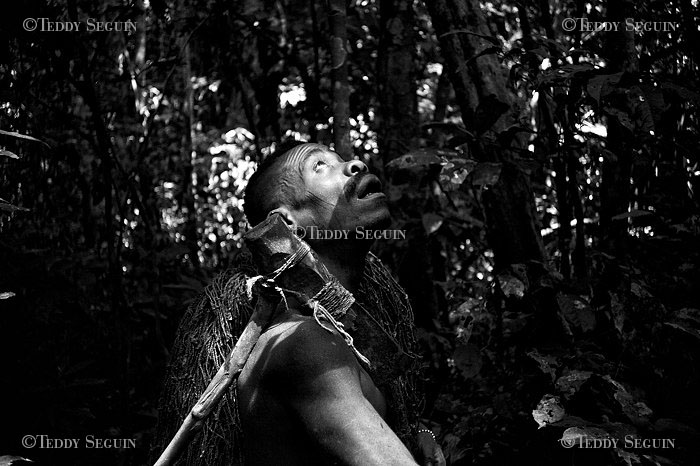
In the forest, pygmies Aka stay the undisputed masters. Their knowledge of the forest is such as the Bantu ones are dependent on the Aka for hunt, picking of coco leaves and medicinal plant.
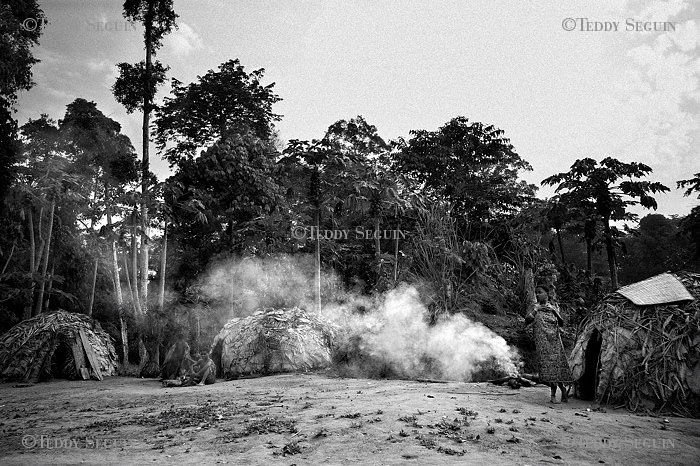
Aka pygmies are always ignored because they are isolated from the central African people, they attempt to preserve their traditional way of life despite the changes imposed by a certain standardization of their environment. They try to turn these changes to oneãs advantage to become free themselves yoke of Bantu villagers who still maintain them again in slavery.
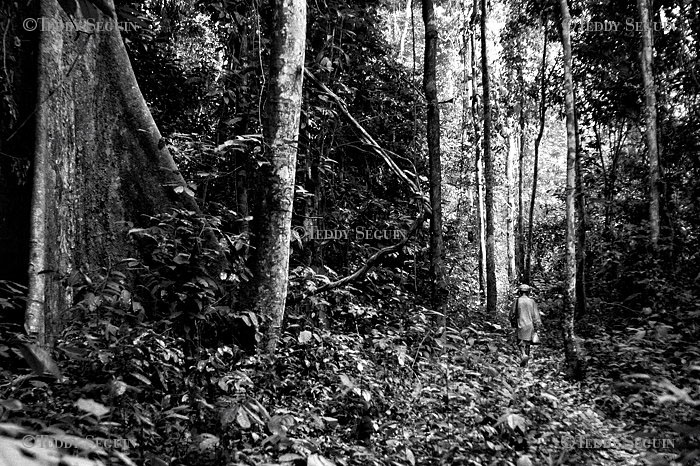
The Aka are nomad, in the past, they always moved their camp in the forest with seasons. Now they are more and more sedentary, their traditional huts conceived for some weeks become a permanent habitat, this is a problem for their health.
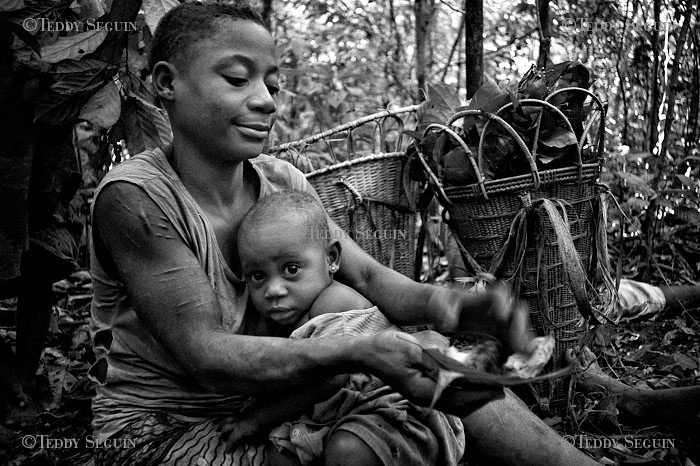
in forest, Aka stops very often to have a snack; caterpillars, various bays, wild yams. For Aka, tropical forest is a real food attic.
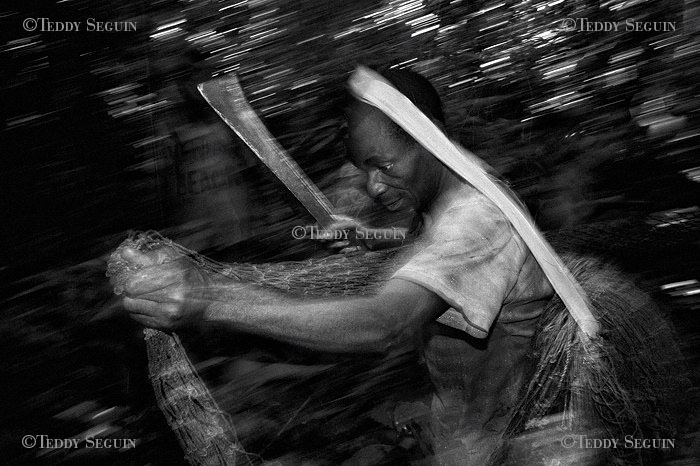
Departure for hunt.
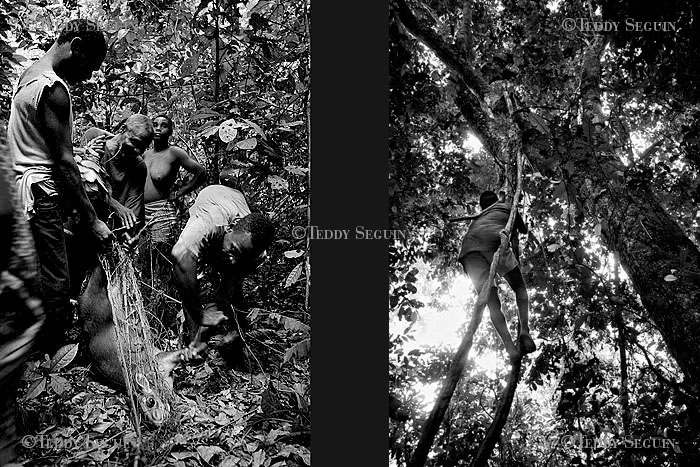
Comme back from hunt. Aka hunts again in a traditional way with nets and spear. Hall the camp participates to this hunt. / Traditionally in Aka food, coco leaves are chopped very fine then cooked. it accompany meats and ball of manioc. To pick it, the pygmies must climb very high in the trees of the tropical forest.
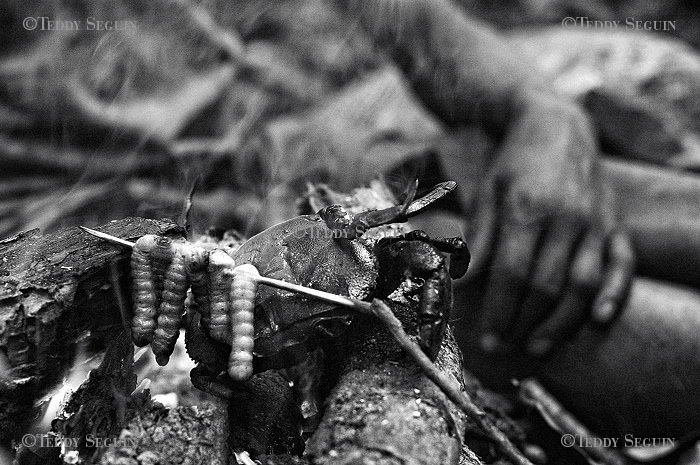
Caterpillars are very appreciated by pygmies Aka, in the rain season, most of them leave their camp and return in forest for several weeks to harvest of caterpillars.
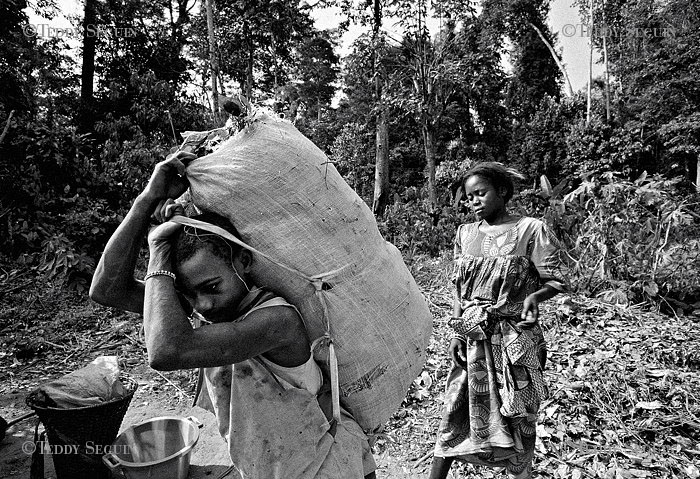
In Wazenguûˋ camp, as in all Lobaye district, Bantu people comes from Bangui, Central African republic capital, to exchange alcohol or crumple with coco leaves gathered by Aka pygmies. Coco leaves grow on a wild creeper in the forest. It constitutes one basis of the Central African republic food.
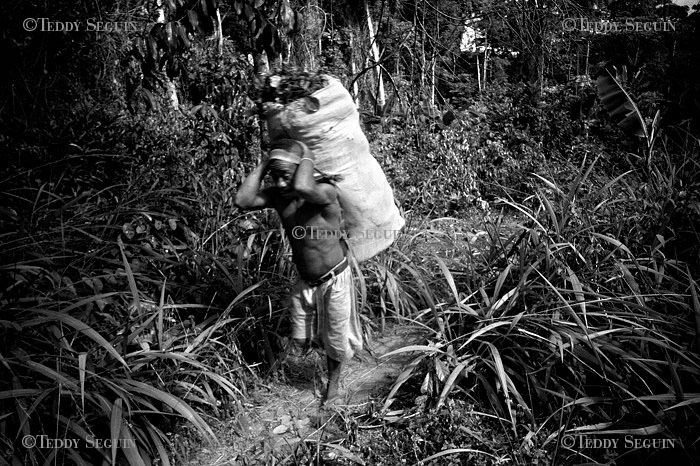
For some sticks of cigarettes, pygmies transport coco leaves bags of more than 50 kg. Wali-coco needs them to carry their coco leaves to the river Lobaye where it will be transported by pirogue then by truck to Bangui.
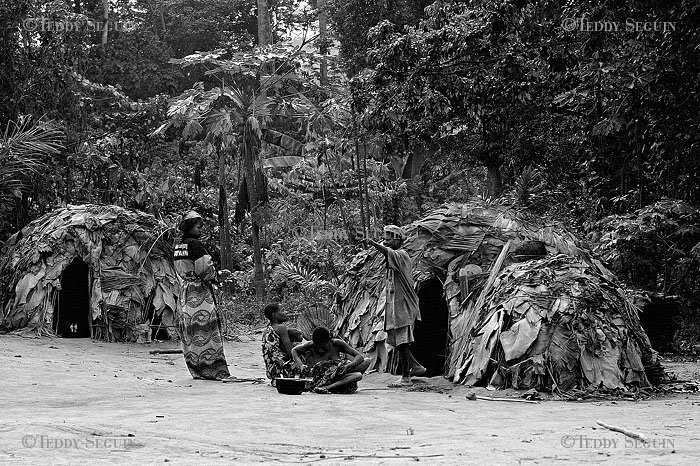
For some sticks of cigarettes, pygmies transport coco leaves bags of more than 50 kg. Wali-coco needs them to carry their coco leaves to the river Lobaye where it will be transported by pirogue then by truck to Bangui.
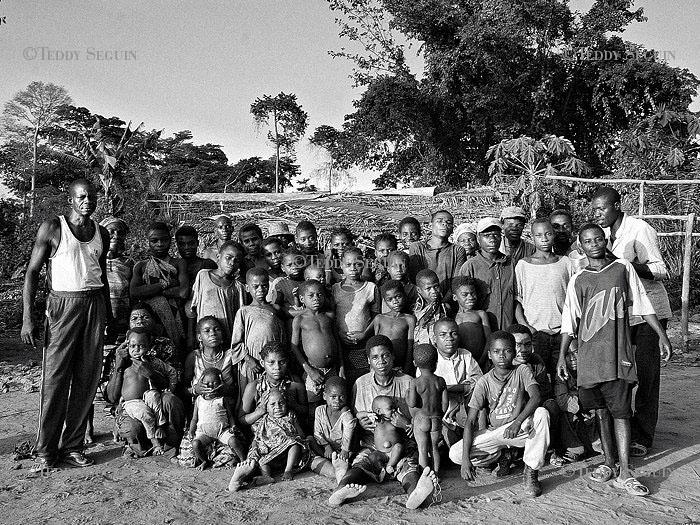
Mossebou village, Abel Ngonzo (to the left) is the master of all Ngombo camp pygmies. He poses proudly with his pygmies who were transmitted for him by his father.
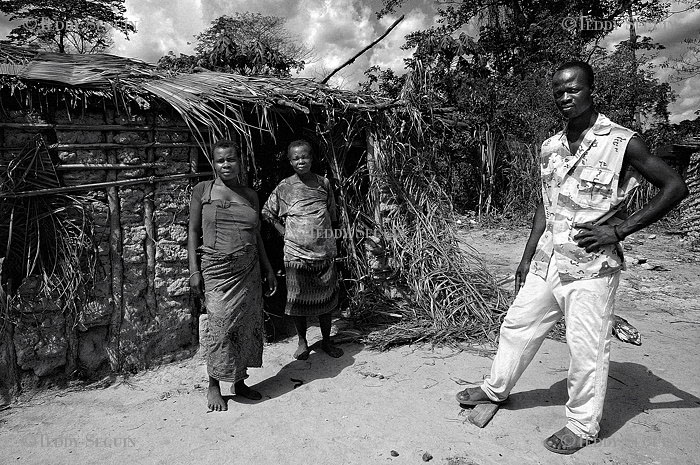
Mossebou village, one Bantu master and his pygmies.
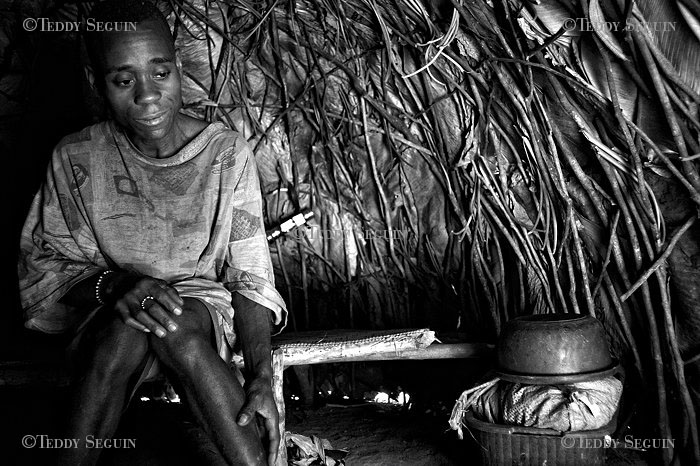
Because of they live again in a traditional lifestyle in the forest and under their small branches huts, pygmies Aka are always considered by lot of bantu like animal, dirty and wild that it is necessary to educate. Itãs why bantu villagers maintain them in slavery.
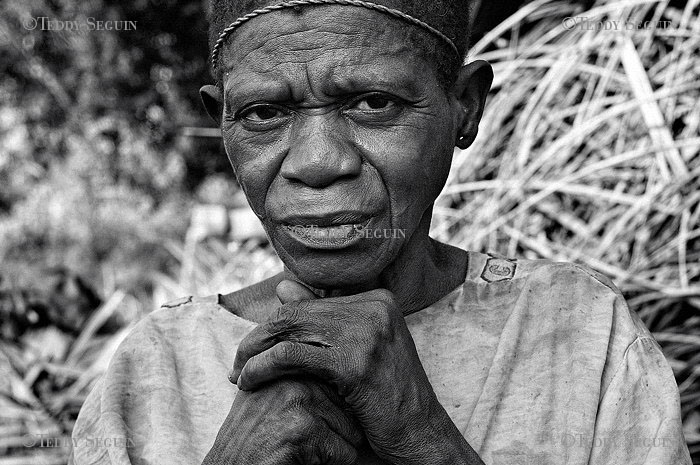
Augustine Acomagna received two bullets in back last year while she worked in his field. She knows his aggressor, a bantu one of the region. Again today, she keeps one bullet inside back and she always feels violent pain. She needs an operation, but she has no money to go to the hospital. She thinks that these gunshots were voluntary but justice never worried the man in charge. Aka do not dare generally to lodge a complaint against Bantu, they afraid of more reprisals. Thanks to the assistance of some NGO like COOPI internazionale, more and more of exactions are denounced and reaches in front of the courts, but penalties still remain very superficial.
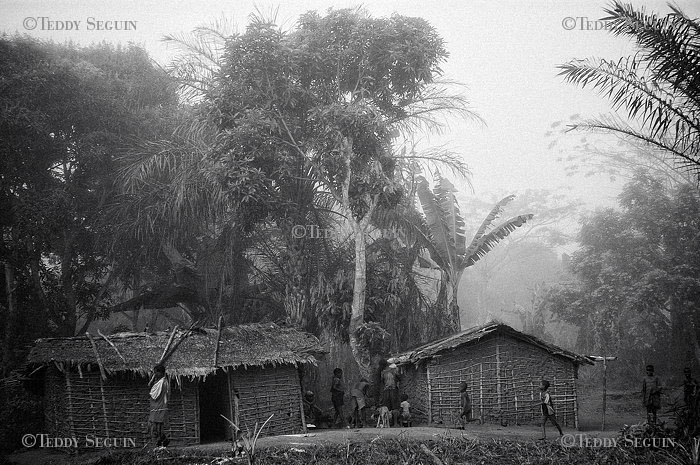
Bûˋlembokûˋ vilage.
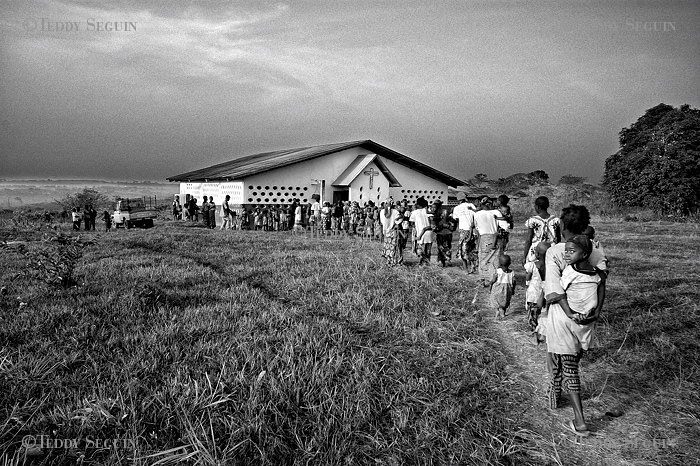
In some vilages, emancipation and modernization cost something, it's Christianity conversion. Pygmy communities are a godsend for the religious obedience of all edge; this is the last Central African Republic non-again converted people to one of big monotheistic religions.
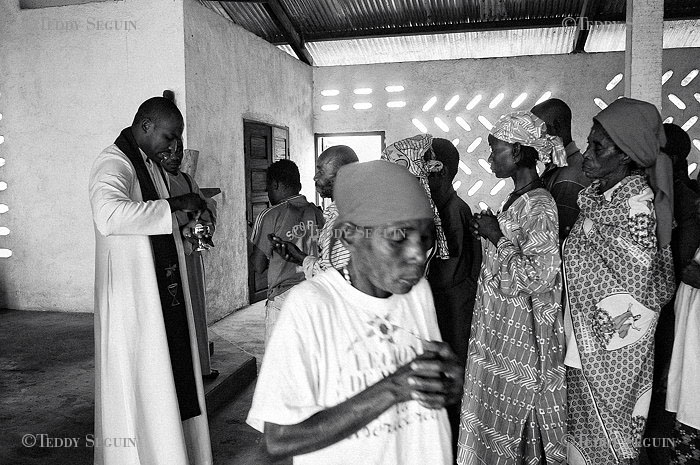
Bûˋlembokûˋ,Sunday mass is celebrated by the father Michael.
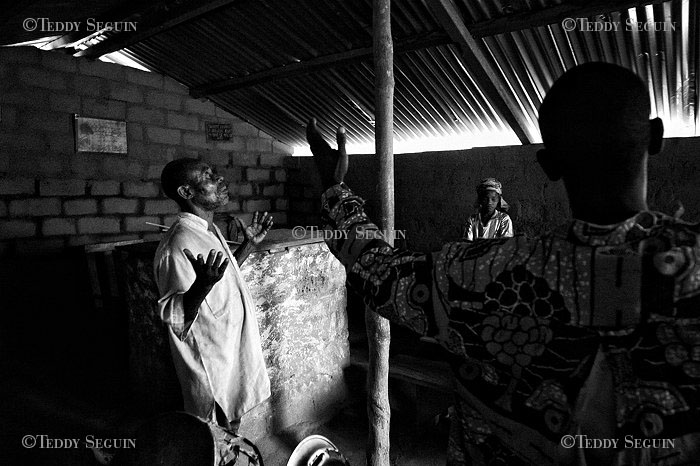
Sunday mass conducted by Martin minister in the temple of cooperation evangelical church.
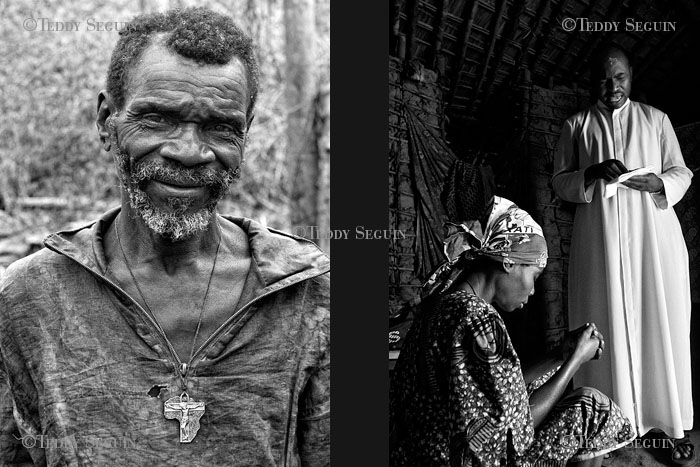
In Ngouma, emancipation and modernization cost something, it's Christianity conversion. Pygmy communities are a godsend for the religious obedience of all edge; this is the last Central African Republic non-again converted people to one of big monotheistic religions. / After the mass, father Michael visits families where patients were not able to move themselves to the church receive the communion to residence.
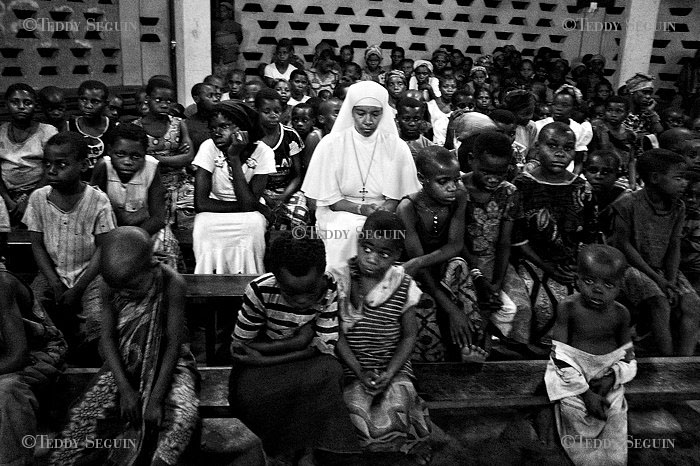
Bûˋlembokûˋ,Sunday mass is celebrated by the father Michael. Since 35 years that fathers settled this pygmy community in the town of Bûˋlembokûˋ, most of them converted to Christianity.
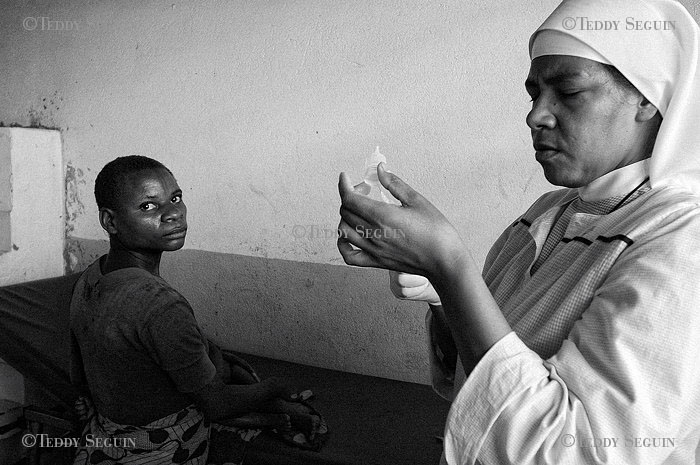
Health center of the religious community of Bûˋlembokûˋ.
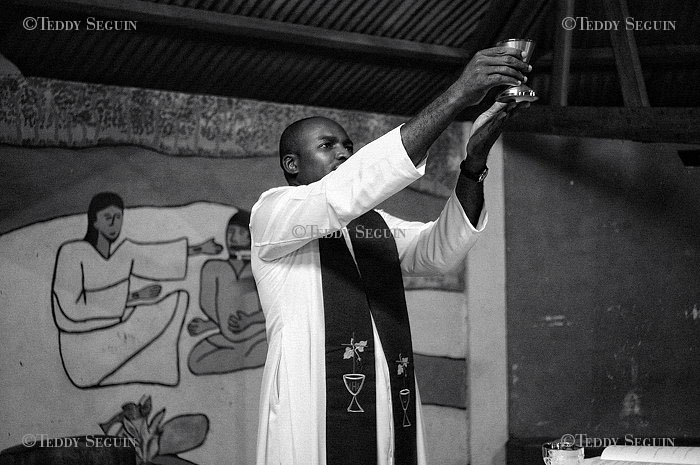
Bûˋlembokûˋ,Sunday mass is celebrated by the father Michael. Since 35 years that fathers settled this pygmy community in the town of Bûˋlembokûˋ, most of them converted to Christianity
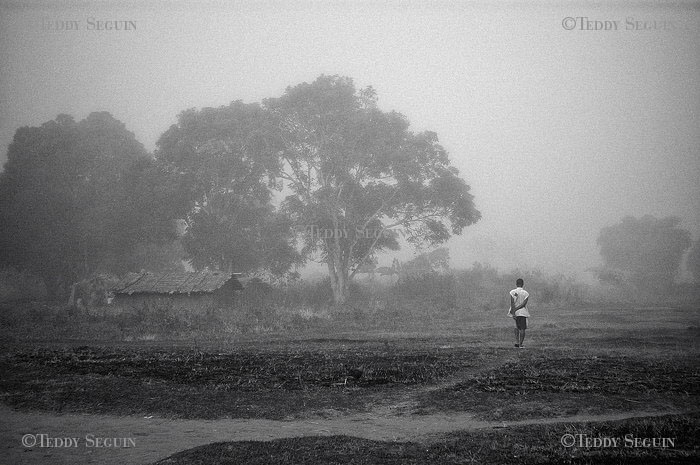
Bûˋlembokûˋ vilage.
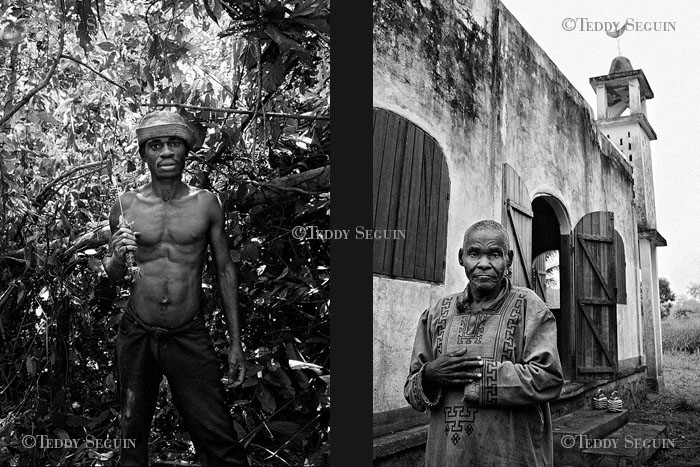
This pygmy belongs to Paul Amobounomokawode, his bantu master. During the dry season, he works in his master plantations to clear the fields. Normally, Aka are paid for this work, but bantu masters tell them that they have not any money to give them palm wine for salary. Central African republic, April 2007. / Mosque of Lokoumba, Jean Tecombo, the firs muslim in this camp. He was converted 15th years ago. After converting, two of this sons can took pilgrimage of The Mecca in 2006 thanks to the association Hama that takes care of "to sensitize" the native communities to the Islam.
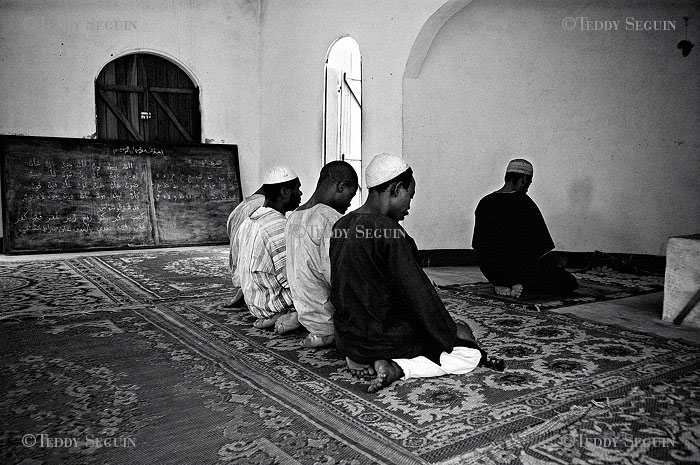
Friday prayer the small pygmy mosque built in 2002 thanks to the financial support of Association des Musulmans d'Afrique (AMA).
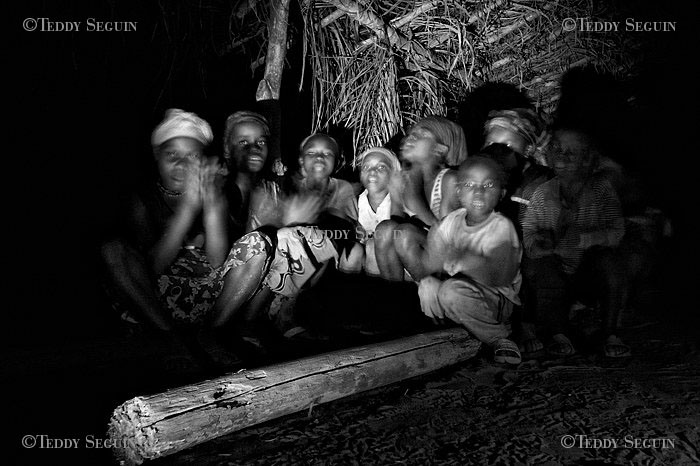
Sunday mass conducted by Martin minister in the temple of cooperation evangelical church.
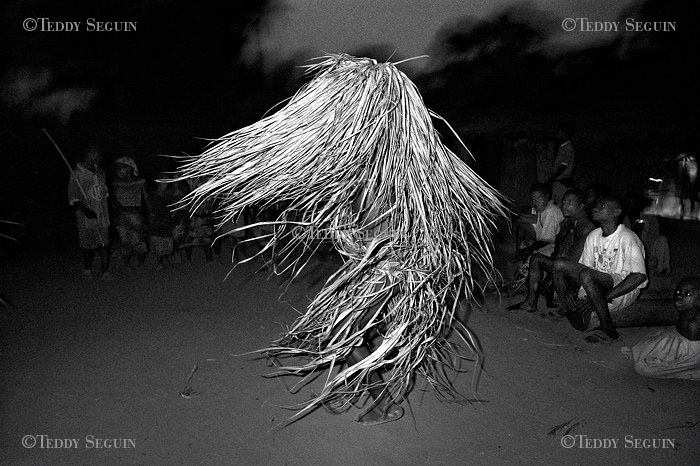
The music and the songs polyphoniques pygmies are very famous. They usali play in honor of the spirit of the forest Ezenguûˋ but one rediscovers them more and more in artistic representations to Bangui and foreign contry.
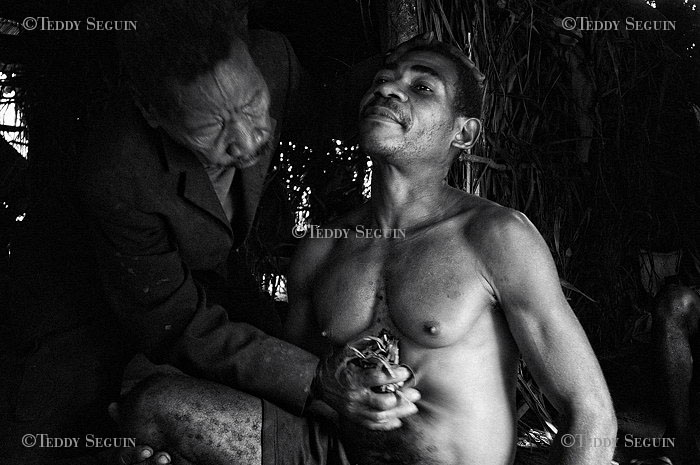
The tradi-praticien Matunda Alube exorcizes the evil of the corp of Emmanuel that suffers since several days of violent pains to the stomach. The pygmies medecine men are very feared and respected in the country for their power. A lot of bantu villagers moves itself in forest to visit these specialists of the medicinal plants.
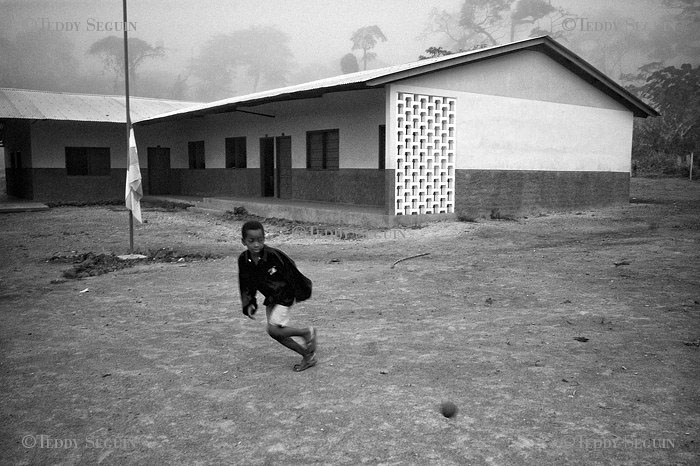
Ngouma school is without protests the most beautiful one and the most modern one of all district, it was constructed by pygmy community thanks to the funds of the Italian association "Amici per it Centrafrica".
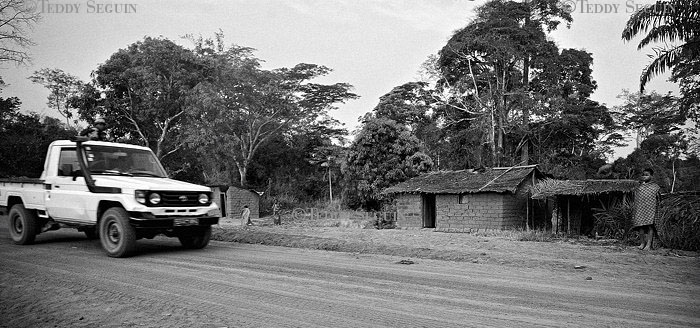
Now, a lot of pygmies came close to the towns, they installs their camp near the mane roads as here in Zoumûˋa. This settling process induces many hygiene problems and of supplying. All their lifestyle changes, the men of the forest turns into farmers.

Commentaires
Aucun commentaire pour le moment.
Ajouter un commentaire
Les commentaires pour ce billet sont fermés.